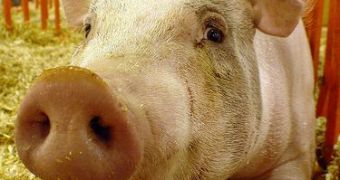A new study carried out by Newcastle University in England and funded by Universities Federation for Animal Welfare (UFAW), found a way of asking a pig whether it is happy or not and actually gets an answer.
Study researcher Sandra Edwards, professor of agriculture at Newcastle University and one of the U.K.'s leading experts in pig welfare said that this “research, for the first time, provides an insight into pigs' subjective emotional state and this will help scientists and farmers to continue to improve the lives of their pigs in the future.”
Team leader Catherine Douglas and Sandra Edwards, both from Newcastle, found a way of knowing if pigs felt optimistic or pessimistic about life as a result of their environment. For this they used a Pavlovian-like method: they taught the pigs to associate a note of a musical instrument to something pleasant like an apple treat, and a clicker used in dog training with something unpleasant like the sound made by a plastic bag.
They then took half of the pigs and moved them in a better environment, much larger, with pig toys, where they could play in straw and the other half in a smaller, more crowded place with no straw. After the separation, the team played an ambiguous noise and watched the pig's reactions.
“We found that almost without exception, the pigs in the enriched environment were optimistic about what this new noise could mean and approached expecting to get the treat,” said Douglas. “In contrast, the pigs in the boring environment were pessimistic about this new strange noise and, fearing it might be the mildly unpleasant plastic bag, did not approach for a treat.”
Douglas says that a similar phenomenon can be observed in humans. When having a bad day and you're called into the boss' office, you are more likely to wander what you have done wrong. The same situation is likely to trigger the exact opposite reaction when you're having a good day.
“This 'glass half empty versus glass half full' interpretation of life reflects our complex emotional states, and our study shows that we can get the same information from pigs,” she added.
This study is part of a larger research that tries to understand and improve animal welfare. Scientists' next step is to refine and validate the technique and thus learn what's most important for a pig's well-being, according to LiveScience.
Edwards said that “although techniques exist to measure stress, in the past we haven't been able to directly ask a pig if it is happy or not. Instead we have assessed production systems based purely on human perceptions and our best interpretations of behavior.”

 14 DAY TRIAL //
14 DAY TRIAL //